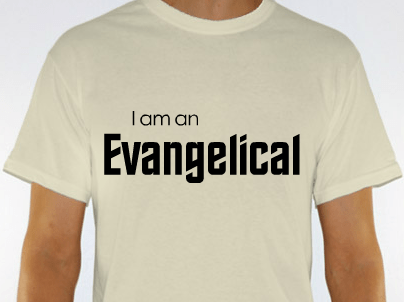 I miss being an evangelical . . . sometimes.
I miss being an evangelical . . . sometimes.
I've been thinking a lot lately how much simpler my life felt when I found myself in the "I am an evangelical" wearing t-shirt days of my childhood.
My church told me what to believe. If I proclaimed a Bible without errors, pro-life convictions, and men as the spiritual leaders of the church, then my beliefs were called good.
My church offered great ways to spend my free time. If I visited Christian conference centers, summer camps and coffee shops with Bible verses on the door, then I could play with confidence knowing I was having appropriate fun.
My church gave me a language to make friends. If I uttered phrases like "I prayed about it" or "I feel led" or "God laid something on my heart," then doors for immediate connection could be opened.
Best of all, my church gave me a path to sainthood. If I gave up my privilege in the United States of hot showers, Calvin Klein jeans and fast mail or internet service as a missionary in Africa, then I was perceived a better Christian than most. Who doesn't want this?
What a life plan! But, it's not easy to live up to this kind of life for the long-term, especially if you a woman, especially if you are a woman called to ministry, especially if begin to believe more in God as mystery than God as THE answer.
These days, I'm proud to be an open-mind Christian who has found a home in the ecumenical movement of the mainline church. I was ordained American Baptist but I serve churches on a weekly basis of all different Christian denominations (and sometimes those of no denomination at all).
Even with this true, recently I attended a conference attended mostly by folks who'd call themselves conservative evangelical Christians, a feeling of loss hit me again.
It was such a pretty scene. So many put together people in one place! I must tell you they were so beautiful!
Everyone brought their Bibles.
Everyone seemed to know each other and the same songs.
No one objected when only men preached or led in prayer.
I felt like an outsider in a tradition that I had once called my own.
But even though progressive Christianity doesn't seem to draw big crowds or get mainstream attention, I know I don't miss the evangelical church enough to go back.
I'm glad that the sponsor of my ordination supports my calling as a woman in ministry, interfaith dialogue and missions that looks more like doing good works than saving souls with words.
I'm glad I could write a spiritual memoir as I did with Birthed: Finding Grace Through Infertility and talk openly about depression, divorce and drinking without worrying about being a church outcast.
I'm glad to be schooled by wise new teachers that would never be found on the bookshelves at places like Lifeway or Family Christian Stores like Barbara Brown Taylor, Anne Lamott, Parker Palmer, and Kathleen Norris.
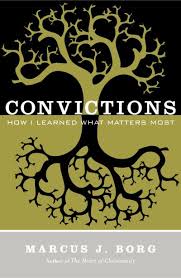 And I'm glad for voices like Marcus Borg who give words to my convictions in ways resonate with my core beliefs. Recently I read his book, Convictions: How I learned What Mattered the Most.
And I'm glad for voices like Marcus Borg who give words to my convictions in ways resonate with my core beliefs. Recently I read his book, Convictions: How I learned What Mattered the Most.
In his opening pages, Borg says this about what progressive Christianity is all about. Here are some my favorite highlights:
I don't know where you find yourself, dear blog reader on the spectrum of Christianity. I hope that you still feel welcome here even if your beliefs are different from mine. Because what I want most for you is what I want most for me when it comes to faith: authenticity.
A place to believe what you actually believe. A place to ask the questions you need to ask. A place to show up without pretenses.
If there's anything I know about what this world needs more of when it comes to religious practice it is telling the truth (even if that leads us from one branch of religion and send on our way to another!). Thanks for listening to mine.
It's summer and time that many of us start thinking about picking up a good book for a Saturdays at the pool or to dive into over vacations. If this is you, here are 4 thought-provoking non-fiction picks I would add to your list . . . books that might make you think about racism, sexual violence, disabilities or fundamentalism differently.
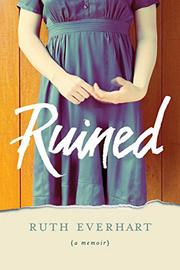 Pre-order now. Will be released on August 2nd. Ruth is a friend of mine from the RevWriting group I participated in from 2012-2015. During that time, I watched Ruth develop, write, and re-write this memoir about her experience of being sexually assaulted while a student at Calvin College and all that came next.
Pre-order now. Will be released on August 2nd. Ruth is a friend of mine from the RevWriting group I participated in from 2012-2015. During that time, I watched Ruth develop, write, and re-write this memoir about her experience of being sexually assaulted while a student at Calvin College and all that came next.
In Ruined, Ruth does not shy away from the hard places of theological shaming, rape, grief and messy vocational callings. From the first chapters I read of this project, I knew Ruth was the real deal. Her command and fluidity of language drew me into her story from the start. Her courage to share her story with such vulnerability pushed me to tell my own. Her willingness to explore theological hard places keep me thinking long after I put her book down. Ruth's story is a one that the church needs because it doesn't shy away from the hard places of life. She tells the truth!
2. Just Mercy: A Story of Justice and Redemption by Bryan Stevenson
Our world needs more angels like Bryan Stevenson and more stories like this one! I literally could not put it down when I started 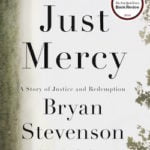 reading it back in April. It was one of those reads where I felt convicted on every page on how much I didn't know that I thought I did about our prison/ justice system in America.
reading it back in April. It was one of those reads where I felt convicted on every page on how much I didn't know that I thought I did about our prison/ justice system in America.
In Just Mercy, we gain a front row of Bryan Stevenson's journey from 23-year-old Harvard Law student encountering prejudge in the criminal system for the first time in the deep south to founder of the Equal Justice Initiative based in Alabama with far reach. This author writes with such clarity and trustworthiness as a narrator that you are just hanging on every word to see what comes of his vast collection of clients. Of special interest is the case of Walter McMillian, a convicted murder on death row-- who we learn is innocent. But the question is will he be released from prison? Though I've heard stories like this for years by colleagues in prison ministry, Just Mercy did something to me. With a softened heart to the cause, I'm ready to act.
3. Unorthodox: the Scandalous Rejection of my Hasidic Roots by Deborah Feldman.
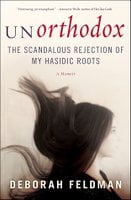 Growing up in a sheltered Christian home, I thought my type of Christians were the only weird ones. But, it isn't true, of course. Fundamentalists are found in every religious tradition. A friend recently introduced me to this memoir of Deborah Feldman saying Unorthodox "is like Jewish version of your life."
Growing up in a sheltered Christian home, I thought my type of Christians were the only weird ones. But, it isn't true, of course. Fundamentalists are found in every religious tradition. A friend recently introduced me to this memoir of Deborah Feldman saying Unorthodox "is like Jewish version of your life."
I was delightfully surprised at what an all-encompassing view Unorthodox gave of what it is really like to grow up as a Hasidic Jew in New York City. We follow her from the days of her bewildering childhood, being raised by her grandparents as a child of a mother who ran away and a father without the mental capacity for child rearing. As much as this author tries to fit in and be a "good girl," one her (especially religious grandfather will approve of) slowly we see her transformation. We see the joy that comes to her from sneaking library books under her mattress. We see the joy that comes as she thinks independently. We see the joy that comes as she makes friends in high school who are also experimenting with the outside world like her. It's quite a journey, this book.
4. Before and After Zachariah by Fern Kupfer
This book might be harder to find in print (written in the 1980s) but it's worth the search if you can find it! The vivid language and emotionally driven plot captivates the heart about of a family's struggle to make peace with the son given to them-- a gift they would have not chosen. This memoir plays out in a quiet Midwestern town through the voice of Fern, the mom, and describes for readers the ups and downs of what it means to birth, raise and make decisions for the care of a severely mentally and physically challenged child. Questions of "When it is it time to institutionalize?" Or "How does a marriage survive such kind of care for another?" Or even "How do you parent a 'normal' child while taking care of such a 'abnormal' one too?" are raised in ways that the reader does not often expect. I was challenged to reconsider how I think about and care for parents and teachers I know who are caring for special needs children.
What are you reading this summer?
(If you missed Part 1 or Part 2, read here to come up to speed).
 Calling outside of the church takes a different kind of spiritual discipline to keep up than calling within the church.
Calling outside of the church takes a different kind of spiritual discipline to keep up than calling within the church.
It's a discipline they don't teach you in seminary: being both pastor and lay person in the church at the same time as deeply growing spiritual being. Or is that even possible?
When I was the pastor, my job description included preaching every Sunday (except the four Sunday got off a year). I had to come up with 2,400+ words to say about God, faith and our life by Sunday morning. No exceptions. It was a built in discipline to think critically and theologically about scripture and community life.
At first, this task both delighted and overwhelmed me. My seasoned colleagues said, "It will get easier. Don't you worry." And it did. Once I got in the rhythm it was harder to take a week off. Not only could I come up with a sermon every week, but it became the place where I worked out my own spiritual musings. My own theological and Biblical wrestlings came forth from within my sermons (even if my congregation didn't know it).
Now, as my calling has taken me outside of the church, I no longer do this. I preach once a month to every six weeks supply preaching for pastor friends out-of-town or filling in on an interim basis in smaller congregations without a pastor.
So where is my theological struggle worked out today?
If I want to keep learning, if I want to keep growing, then I have to keep my mind engaged. With our travel schedule, I've had to find my spiritual life outside just attending just ONE church.
And it takes discipline.
It takes discipline like initiating reading a book on spiritual practice with a friend and discussing it together though no one tells you to do so.
It takes discipline like engaging your preaching friend's sermon prep process, even if you will not be asked to speak on the passage.
It takes discipline like seeking out people of faith that challenge you-- even if you have to make a journey several states over to visit them.
It is so much harder to do outside the church (when one community isn't at your disposal), but it doesn't mean it is impossible. And it doesn't mean that rich spirituality has to be found in a box checked, "Hi, my name is Elizabeth and I am a member of this small group at this church." It can be found as opportunities present themselves to embody church in daily life.
I've been reading Addie Zimerman's new book, When We Were on Fire: A Memoir of Consuming Faith, Tangled Love and Starting Over (it's an amazing must read for any of you who grew up in evangelical land as I did).
One of the phrases that has stuck with me so far from this book is something that Addie's husband, Andrew says about church.
The two of them were "shopping" for a new church as a young married couple and kept hitting walls of frustration with the traditional church model which to them felt over packaged, inauthentic and all about awkward conversations around coffee pots in the corners of Sunday School rooms.
Addie keeps trying to find the perfect church while Andrew wasn't so wrapped up in the structure kept telling Addie his motto: "But we are The Church." Or in other words, church is not something we go to but something we experience every time 2 or 3 are gathered in Christ's name. (The two eventually joined a house church).
It takes discipline to remember that church is not noun but a verb. And that as we set out on this path to follow Jesus, there is not just one way to live out our faith.
We might spent our whole lives figuring it out and then realizing we were wrong and figuring it out again.
We might do it within the membership roles of a congregation. Or we might not. Jesus still loves us the same.
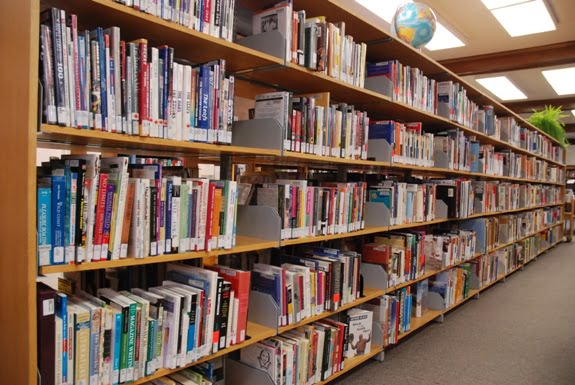 I don't know how to have faith without gathering gems from spiritual teachers along the way-- especially those in print.
I don't know how to have faith without gathering gems from spiritual teachers along the way-- especially those in print.
Recently I was asked about what were some of my favorite spiritual reads. I thought I’d share some of the books on my list here.
If you are looking for more than a fluff read for an summer beach trip, I’d say check some of these out. Your soul will thank you later.
1. Life Together: The Classic Exploration of Faith in Community by Dietrich Bonhoeffer. It’s a book that is a must read. Truly. Have you ever wondered about how you can truly be both alone and with others at the same time? In this spiritual classic, Bonhoeffer explores what it might mean to life in community in such a way that is true to the New Testament model of the church.
2. Traveling Mercies: Some Thoughts on Faith by Anne Lamott. People either love or hate her, but I find myself in the love category because of her honesty. If you’ve never picked up an Lamott book, check her out . . . you might just find yourself challenged to open your own heart to some honest space.
3. Soul Survivor: How Thirteen Unlikely Mentors Helped My Faith Survive the Church by Philip Yancy: Read this and be challenged by how radical and transformative message of Christ and how Christ meets us in the witness of each other-- folks who are both living and dead. I read this book the summer before I went to seminary and found it to be quite an encouragement to keep on going. (or try Yancy’s What’s So Amazing About Grace?)
4. Amazing Grace: A Vocabulary of Faith by Kathleen Norris. Come explore with Norris the world of religious language and culture through a new lens. You may find yourself liking the word “sanctification” after all. (Or try Dakota: A Spiritual Geography if you are in the mood for a memoir).
5. Life of the Beloved. By Henri Nouwen So many of Nouwen’s works are classics, but this one is especially wonderful as it challenges all of us to reconsider what it might mean to see ourselves as Christ’s beloved— one of the dearly loved children of God which we are. (Or try Inner Voice of Love)
6. Sabbath: Finding Rest, Renewal and Delight in Our Busy Lives by Wayne Muller. Muller provides an interfaith framework for why rest is so important in our lives. We must rest in order to experience God’s presence in our lives. Thoughtful questions end every chapter as a way to bring the conversation home. (Or for busy parents try Sabbath in the Suburbs by MaryAnn McKibben Dana)
7. The Ragamuffin Gospel by Brennan Manning. You just can’t go wrong with Manning—it’s an oldie but a good one. In need of some grace in your life? Manning explores how most of us fail to accept this wonderful aspect of life in Christ. Come explore how God is already smiling on your life no matter how bedraggled, beat-up, or tired you feel.
8. Altar in the World by Barbara Brown Taylor. I can’t help but think that the presence of God is all around us—in our daily work, in our relationships and in our rest. BBT explores paying close attention to the presence God without ever leaving your home ore community. Gems of narrative within to last for a long time.
What classic books would you add to such a list?
Continuing with my series of questions about the life of faith. Up today: why do you read the Bible?
 When I was a child, I was told that the Bible was God's word, no errors in it at all. Moses, you know, wrote the first five books and Jesus said word for word everything we find in the red letters.
When I was a child, I was told that the Bible was God's word, no errors in it at all. Moses, you know, wrote the first five books and Jesus said word for word everything we find in the red letters.
I was taught to read scripture regularly because this helped me to live a life pleasing to God. I was told to have a daily scripture readings in my routines, to memorize scripture, and to use scripture to help me figure out what it was that I was to do in my life, finding a life verse to guide all my days.
I was encouraged not to stray from the morals of the good book (no drinking, fornication, or wearing two piece bathing suits were among the favorites of my youth pastor)-- for if I did, then bad things might happen to me the pastors said. And who wants that, right? I needed to follow orders!
In fact at my church, an extracurricular activity for us church kids in elementary school was Bible drill. "Study to show thyself approved unto God" we were told over and over again. The implied message was God would like us more if we knew this Word.
On Sunday afternoons before choir practice, we'd memorize the books of the Bible-- learn to say the book before, the book after (for example, Genesis, Exodus, Leviticus). We'd memorize scripture passages-- 25 a year. And, after a school year of prep, we'd go to competitions-- local and statewide. In 3rd, 4th, 5th and 6th grade in fact, I was a state champ in Bible drill in the state of Tennessee. Bible drill seemed to take well to me and I to it. I knew scripture well, at least the lections I was taught, verse by verse at a time.
When you are taught the Bible this way and encouraged to think of the Bible this way-- as something to be conquered as something to be read in chunks, you can easily begin to take scripture out of context. For example, verses like I Timothy 4:11: "A woman should learn in quietness and full submission" can be used destructively, destroying the self-confidence of an entire gender of the human race. As as I heard Brian McLaren say at a conference this year on children, youth, and a new kind of christianity: "Scripture can easily become loaded time bombs ready to explode." Yet, when your faith begins to beckon you to ask the bigger picture questions where there are no easy answers, confusion, disillusionment, and apathy can easily set it.
I've been reading this week, Rachel Held Evans' book Evolving in Monkey Town and she speaks of her personal journey of just this. (A great read, I might say. Check it out). After growing up in a conservative home in the South, Evans finds herself as a young adult wanting to love scripture, knowing it well, but being repulsed by it and the community she reads it with for they have great distaste for her questions. My story is similar.
There came a point in my life when I stopped reading the Bible for devotional reasons. It was the second month after I was ordained as a pastor. What should have been the most joyous junture of my life was one of the lowest. I wondered what in the world I'd gotten myself into, being a "professional Christian" who now was not allowed to question her faith?
Regardless of any fears, cold turkey one morning I gave up devotions. My morning routine changed for years from what it had once been. Again, not something that you expect a preacher to admit but it's the truth. It was just so hard for me to reconcile the faith I was taught in small chunks of Bible drill with the God I wanted to love, the God I thought I knew, and the faith that I knew had the power to do something for good in the world. I was upset that the church wanted to condemn all of my friends of other faiths without even the chance to know their hearts.
I could have very easily lost my faith. I could have easily lost my job if my supervisors knew it. It ate me up inside not to be a space where I could be honest. But, I knew I needed rest. I needed to find another way. And, soon I found myself into the loving arms of Washington Plaza Baptist Church.
Preaching every week has saved me. By making it a point to preach in context with an eye for the "non-tradition" interpretation, with eyes open to apply to my own life-- step by step I've come back. For in having to wrestle with scripture every week no matter how I felt or didn't feel, God has spoken to me, guide me to center again. Preaching has helped me engage with texts that have just been what I needed to see God's presence in some difficult situations of my own life.
And though there are those colleagues of mine and naysayers who want to say, "Shame on you. How can you be a preacher if you only read your Bible in preparation for your sermon?"I say thank God I had at least sermons to preach regularly for the last several years! And, at least I'm being honest.
I'm now beginning to read scripture again, but never like I did in elementary school or even college when I used to spend hours doing Beth Moore expository studies on the back porch of my dorm room.
I read scripture to see God's story-- to see how God has faithfully guided humanity into relationship with the divine. I read scripture to know who God is-- to gain a countercultural view of the world where the first shall be last and the last shall be first. I read scripture to be reminded of God's inclusive love for all people-- to see how even in the passages I want to throw out for their harshness of cruelty, there's a message of hope, justice and concern for all. I read scripture to remember who I am and who I'm not-- I am a beloved child of the great mystery of the divine.
I'm glad for how the gift of weekly preaching has saved my faith over these past four years. I'm thankful for a congregation who has entrusted in me this privilege, having no idea what kind of gift they were giving me to grow alongside them. I'm glad that the memory verses I learned as a child were not wasted on state trophies long past, but have come to be a part of the larger picture of faith I keep finding a way to make my own.
For I believe, all of us are on a journey with scripture-- a journey that is unique as the fingerprints on our hands-- and who are we to judge the quality of one another's faith by the sheer number of times we pick up the book? Who are we to ever say 100% that we know what a passage means? Who are we to say that the revelation of God through scripture will not continue to find us, no matter what we do? Even preachers need to hear the good word too. Church everywhere: give us grace to grow-up too.
When is the last time you felt alive? When is the last time you felt free with passion bringing light to your eyes that you thought was long past? When is the last time you danced?
For me, being connected to new ideas and meaningful conversations always enlivens.
In this matter, if you've followed my blog for long you know that reading and being introduced to quality books is one of my favorite things. So, how grateful I was to be given some new texts to check out via conversations with the regional director of Feed the Children East Africa, Seintje who I met over the course of our recent travels. Seintje, being a native of Holland and seminary trained in the UK, shared with me several of her favorites that were new finds for my collection.
And I didn't have to wait long to find them. After a stop at a Catholic bookstore in downtown Nairobi a couple of days ago, I was able to pick up a copy of one of her recommendations called Awareness: the Perils and Opportunities of Reality by Anthony De Mello.
I was immediately drawn in to this book of insightful spiritual wisdom from the very first pages. Especially as I read these words of exhortation by Mello: "My business is to do my thing, to dance my dance. If you profit from it, fine; if you don't too bad! As the Arabs say, 'The nature of rain is the same, but it makes thorns grow in the marshes and flowers in the gardens.'"
What I love about this particular quote is the clarity of the idea shared. It's direct and to the point: how often are we all guilty of moving in the direction of someone else's life path and not our own. We so easily make the moves of our lives based on a cultural blueprint rather than what might be our new course to blaze. When we do this, we aren't awake to our own lives, as Mello writes. We are sleep walking instead.
I met several large groups of women this week who greeted our Feed the Children delegation with dancing and singing. No sleep walking for them, literally. As we got out of the car on several occasions, the welcome started cheering loudly and dancing with hands raised! These women could have had easily shied away from being themselves, we were strangers after all. But no matter what excuses they could have given-- they danced. They danced in their own way at their own pace with joy on their faces to be able to share their lives with us.
So too, this must be our way, says Mello. We all have our dance and we must get to it. Our dancing will be like rain on the parched ground for some who have forgotten what joy looks like. Seeing us dance might remind them how to dance again too right where they are.
Yet, others, who are walking in the dark (and very much liking the way things are) will look at our dancing and point their fingers in exclamation of our insanity. Stop living this way! Stop being so happy! You can't live like this. You're exposing our anxiety and loneliness. You're exposing our fear.
They'll say these things because they are jealous of our freedom. They'll wish they could cut loose too. They haven't yet learned to dance.
But no matter what, our invitation to dance by our God remains. We all get this invitation. Our dance card is ready. Time will tell where we will go. We just have to get to it: dancing our dance. It's ours to dance alone.
When people ask me what my hobbies are, I usually feel quite lost. I'm not sure exactly what to say because I don't naturally gravitate toward activities that seem hobby worthy (getting pedicures just doesn't count does it?). But, there is one thing I always do regularly-- even as dorky as it may be-- and that is reading. My life just doesn't seem in balance if I don't have something or somethings ready to go on my night stand. It is hard to pack for vacation sometimes because I simply do not have luggage space for all the books!
I've stumbled upon a few great ones lately that I thought might be worthy to share here with blog readers. Most are prose that have inspired me to think or re-examine what I believe about something-- my favorite type of books instead of just the fluffy entertainment driven novels (for me, this is what tv is for). If you've read any of these and have a strong reaction for or against in someway, I'd love to hear more about it.
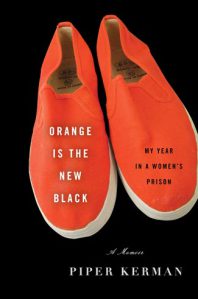 1. Orange is the New Black: My Year in a Women's Prison by Piper Kerman
1. Orange is the New Black: My Year in a Women's Prison by Piper Kerman
"With a career, a boyfriend and a loving family, Piper Kerman barely resembles the reckless young woman who delivered a suitcase of drug money ten years before. But that past has caught up with her. Convinced and sentence to 15 months at the infamous feral correctional facility in Danbury, Connecticut, the well-heeled Smith college grad is now inmate #11187-424 . . . "
After finishing this one, I found have new appreciation for the injustice and conditions of women's correctional facilities in our country. The humanity of women in prison, the stories that led them to be there, and the toil of their daily lives beyond bars captured me and I could hardly put this book down. Though we often what to tell the stories of prison of "bad people" vs. "good" this memoir breaks a part this stereotype and leaves it here for the entirety. I was inspired to think about how I might be involved in prison reform in the future and believed that this book would be a great text for a book club at a congregation discerning the beginnings of a prison ministry.
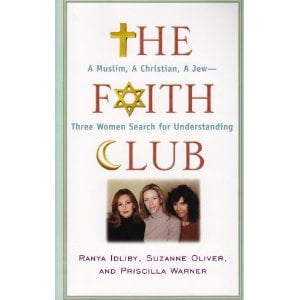 2. The Faith Club: A Muslim, A Christian, A Jew-- Three Women Search for Understanding by Ranya Idliby, Suzanne Oliver and Priscilla Warner
2. The Faith Club: A Muslim, A Christian, A Jew-- Three Women Search for Understanding by Ranya Idliby, Suzanne Oliver and Priscilla Warner
Though not a new book, with the 10th anniversary of 9/11 coming up, it is a great one to pick up for it is a story that began out of this tragedy. Three women, mothers, of different faiths wanted to get together to write a children's book about tolerance and peace in the wake of how the events of 9/11 forever changed the city of New York, where each lived. However, as soon as they began to meet to begin to work on the project, they learned that there was no way they could work together if they did not know each other first. And, thus began a series of Interfaith conversations that became this book.
This text is one that a group of us from Oakbrook Church, Northern VA Hebrew Congregation in Reston and the Adams Center in Sterling, VA along with folks from Washington Plaza are using to have an Interfaith conversation in our local community. We've met once already for our "faith club" gathering and look forward to more. If you are interested in joining this book club, let me know!
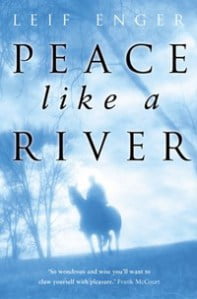 3. Peace Like a River by Leif Engler
3. Peace Like a River by Leif Engler
It's a novel and I normally stay away from novels, but really found myself drawn to the language and imagery of this one, especially after several of my colleagues at the Collegeville Institute recommended it several weeks ago-- many as their "favorite read" on the first morning of our group sharing.
"The novel is narrated by Reuben Land, an eleven-year-old boy suffering from severe asthma who lives with his unusual family in a small Minnesota town in 1962. His mother abandoned the family years before. He is among three children: his older brother Davy, who is sixteen years old when the story begins; and his younger sister Swede eight years old, and an imaginative writer and poet. His father, Jeremiah, a school janitor, is a man of faith who quietly performs miracles – one of which is to bring Reuben to life after his lungs failed to inflate when he was born. Reuben is the only one who ever sees or notices these miracles; he concludes that he is meant to be a witness to them."
And, this is just the beginning of the adventure . . . check it out.
4. Before and After Zachariah by Fern Kupfer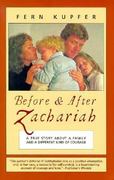
This is a book recommended to me by Sari, the writing tutor from my week at Collegeville. And ever since I started it, I just couldn't put it down. The vivid language and emotionally driven plot is captivating. Again, not a new book-- written in the 1980s in fact, but full of powerful insights for any going through a time in their life of pronounced pain and loss-- not only for who or what might have died, but for what is living and still is just not as it should be.
This mid-western family documents through the voice of Fern, the mom, the ups and downs of what it means to birth, raise and make decisions for the care of a severely mentally and physically challenged child. Questions of "when it is it time to institutionalize?" "how does a marriage survive such kind of care for another?" and "how do you parent a 'normal' child while taking care of such a 'abnormal' one too?" are raised in ways that the reader does not often expect. I was challenged to reconsider how I think about and care for parents and teachers I know who are caring for special needs children.